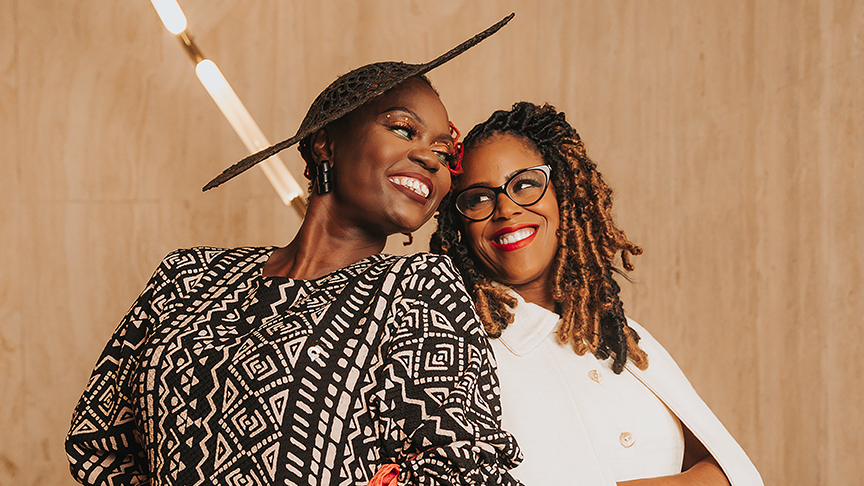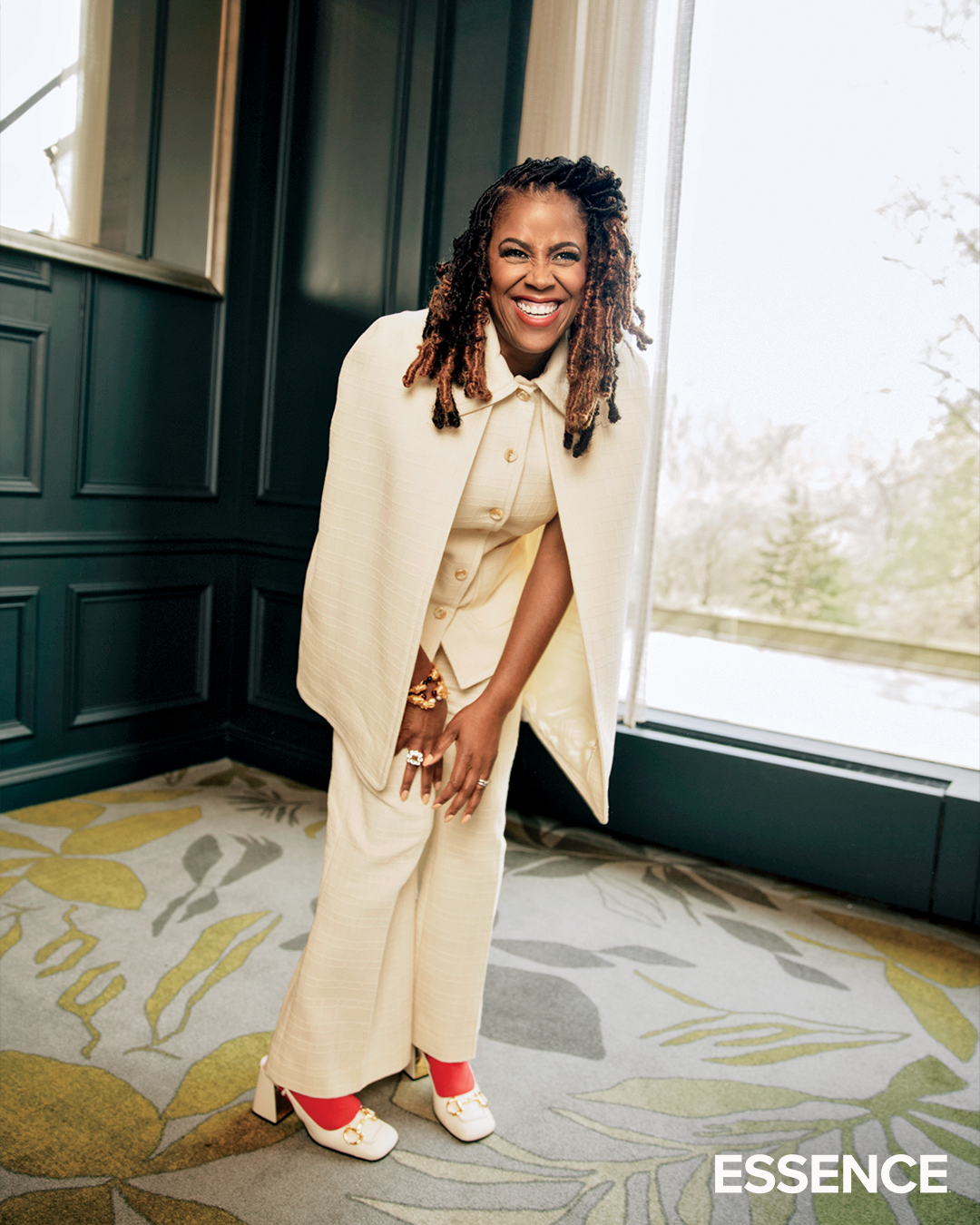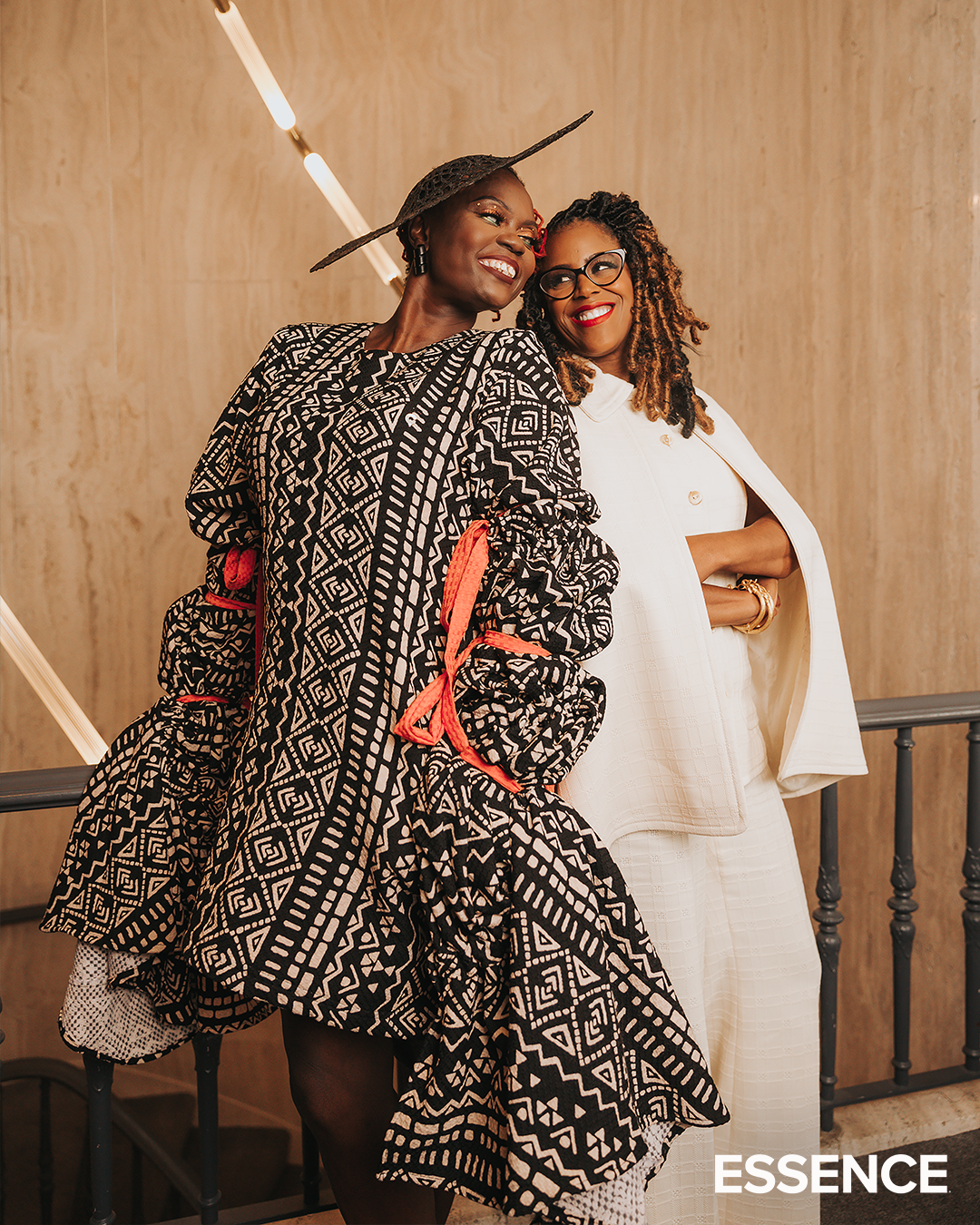
When Thasunda Brown Duckett was named president and CEO of the Teachers Insurance and Annuity Association of America (TIAA) in 2021, she joined the rarefied ranks of Black women who, according to USA Today, make up 1 percent of executive officers at Fortune 500 companies. Until Duckett stepped into the top job at TIAA, Rosalind “Roz” Brewer, CEO of Walgreens Boots Alliance, Inc., was the only Black woman CEO in the S&P 500. Now Thasunda Brown Duckett is on the exclusive Fortune 500 list, which overlaps with the S&P 500.
Duckett credits her rise through the ranks and attainment of success to her parents. Born into humble beginnings in Rochester, New York, she spent her early life in New Jersey and later moved with her family to Texas, bringing only what could fit into one car. Her gratitude, her ambition and her ability to reflect on her roles and titles—in the moment she is experiencing them—have a direct bearing on her continuing achievements. The CEO and president particularly values the ability to be vulnerable, especially as she herself has experienced loss this year. Here, she embraces the “mess” that she was—and shares how she harnessed the power of being authentic.
Caroline Wanga: Who is Thasunda Brown Duckett?
Thasunda Brown Duckett: I am a mother, a wife, a sister, a daughter, an auntie, a sisterfriend. I am an executive. I am an impact maker. I am a child of God, anchored in my faith, and here to make sure that I’m doing my very best to inspire and make a difference. Who am I? I stand on the shoulders of giants. I’m on the shoulders of women who couldn’t even imagine this conversation but still fought for the possibility, because they knew that better was in our future. So I am all of that—and sometimes I am a mess. But I am all of that.
Wanga: I love the way you described yourself, and I love that you said, “And sometimes I’m a mess.” For me, it would be, “I’m a mess most of the time.” But let’s talk about what you mean by the word mess, and what does “Sometimes I’m a mess” mean?
Duckett: Sometimes I am a mess when it comes to not being the perfect wife, the perfect mother, the perfect sister, the perfect friend, the perfect daughter. But that mess means I’m giving it all that I have. I’m leaving it all out there, mess and all—because when you love and when you’re giving your best, best comes with mess. The mess helps me to appreciate the beauty.
I think about November 13, 2022, when I lost my brother unexpectedly. I was a mess. But within that mess, I still had to be a mother, a sister, an executive, a wife. What I love about the moment in the mess is that I am reminded that even when you’re broken, you’re affirmed, because of the sisterhood, family, my colleagues. It was everyone seeing my mess and telling me, “I got you.” So that’s where that vulnerability lies. It’s okay to say that you’re a mess. It’s okay to say you’re not okay, because that allows people to step up for you—to stand in the gap when you can’t.
I think it’s important for women to understand they have to own their mess, because within that mess is where humility lies. Within that mess is where empathy lies. You know what? I’ve been there. When we think about a mess, we think about living life. We always say we’re either going through something, coming out of something or about to go into something.

Wanga: My brother’s unexpected death was November 12. I didn’t realize until you said the date of your brother’s passing that they were that close together. I’m sure for you, as for me, the sister never stops grieving. Do you have anything that has helped you deal with the grief?
Duckett: My faith and my family—but also recognizing that to have this level of grief means I experienced an unbelievable level of love. You don’t have this grief without a lot of love, and my brother was everything to me. We called ourselves “the unit.” It also helps me to understand that the spirit is still here. I may have lost him in the flesh, but I feel him—his spirit is still with me. I would also say his legacy comforts me. He has children and grandchildren, which means he is continuing, and the impact that he made is continuing. We have to give ourselves permission to cry. We have to give ourselves permission to hurt, to ask questions, all of that. But then we also have to remember that this is life—and when you love hard, you will grieve hard. But that’s also the gift.
Wanga: Culturally, as Black folk, we say names.
Duckett: Otis Jamaal, “OJ”—my older brother, my inspiration, my biggest fan.
Wanga: For my brother Victor, who did everything in his power to exist in his power, and the legacy he left behind. We dedicate this conversation to Victor and OJ.
Wanga: So let’s talk about where the Thasunda journey starts.
Duckett: I like to say my family was long on love. Long on love. A lot of laughter, sports, faith, example. But we also understood what it meant to struggle. I saw firsthand my parents doing their very best, dreaming for us—but the financial insecurity would get in the way. But what I also know is that my parents’ self-worth was not defined by their net worth. We then moved as a family to Texas, and I tell this story because we moved with everything that we had in the car, along with Mom, Dad, Reggie, Jay and myself. I know what it’s like to start from the bottom. I know what it’s like for parents to create a new day for their children.
Wanga: How did all of that lead to your foundation?
Duckett: I saw my dad stand up for us and others. I saw my father be that father to so many young boys. I saw my mother tutor students, our friends, who did not think that they were smart. But Rosie Brown said, “You can learn, and you will learn. You are smart.” At the retirement party that I threw for my dad, grown men came up to my mom and said, “Mrs. Brown, you told me I was smart. It mattered.” I saw my mom fix a big pot of spaghetti and feed the neighborhood. The point is, my parents were ordinary people, but they made an extraordinary impact. I believe you give people their flowers while they are here. And this is an expression of flowers for my parents, to let them know that they matter, not just in my life and my brother’s life, but in so many others.
That’s why we started the Otis and Rosie Brown Foundation, extraordinaryis.org. Extraordinary is dreaming. Extraordinary is standing in the gap. Extraordinary is perseverance. And so we give out scholarships based on character, your ownable assets— because when all those rented titles are gone, you are still who you are at the core. You are still kind. We make awards through small not-for-profits that are doing extraordinary things with ordinary resources. And the best feeling is when your mom and your dad can have a blown-up check that says Otis and Rosie Brown Foundation, and they are presenting it to a child as something that hopefully can change their life, just as they changed my life in such an extraordinary way.
Wanga: Why is it important for you to talk about “rented” titles and how core character is what matters more?
Duckett: I mean, you’re a CEO, I’m a CEO. I grew up through corporate America. To know early that my title is rented gives me permission to know: Regardless of what’s going on at work, regardless of whether there’s a moment that my work may not be needed or wanted, I am still whole. To know that my title is rented means that I understand where my value lies.

I think what happens so often in our society is, we’re chasing something that we don’t even own. Something that we will not forever have. Instead of affirming and understanding that within my rented title, I need to remember that it’s my personal assets that have currency. And so when that job is no longer for me—I may leave my business card, I may leave the laptop and all the documents, but I am taking my intellectual curiosity. I am taking my grit, my perseverance, my kindness, my joy. Those things are mine. So rent your title, but own your character. That will allow you to see people and to understand that every day you’re being mentored. You just need to open up your eyes and receive it all.
Wanga: Recognizing that title as something you rent versus owning changes the urgency of understanding why you’re here. Because if you take the approach of rented titles, you have to have something else—and so it increases the urgency to figure out what it is you are here to do. Because once you step out of that notion of I own this title, you’ll be in a little bit of an oblivious place if you aren’t being intentional about that journey. And I think that’s important to understand.
Duckett: It starts to connect the dots. So if I say, “Man, why did I grow up with financial insecurity? Why did I start my career at Fannie Mae, where the mission is the business and the business is the mission of home ownership?” The first time we experienced home ownership was when I helped my mom and dad buy their home. Why am I here? Why did I become the CEO of different businesses at JP Morgan Chase, and do all the things that I’ve done? And why am I now the CEO of TIAA Retirement? Why?
Wanga: Purpose. What advice do you have for those who are continuing to find the chief within themselves?
Duckett: Optimism. There are more Black women CEOs of their household, CEOs of their company, CEOs in corporate America, CEOs in politics. That is encouraging. We have more work to do, but there is a sisterhood that is available and real. Make sure you take advantage of it, and understand that your self-worth is not defined by your net worth. Without judgment, let’s get going and move past inequality. Let’s get going and make sure we can have a secure retirement. And let’s make sure the chief in all of us knows that the world is waiting. The world needs us. Let’s get it.


